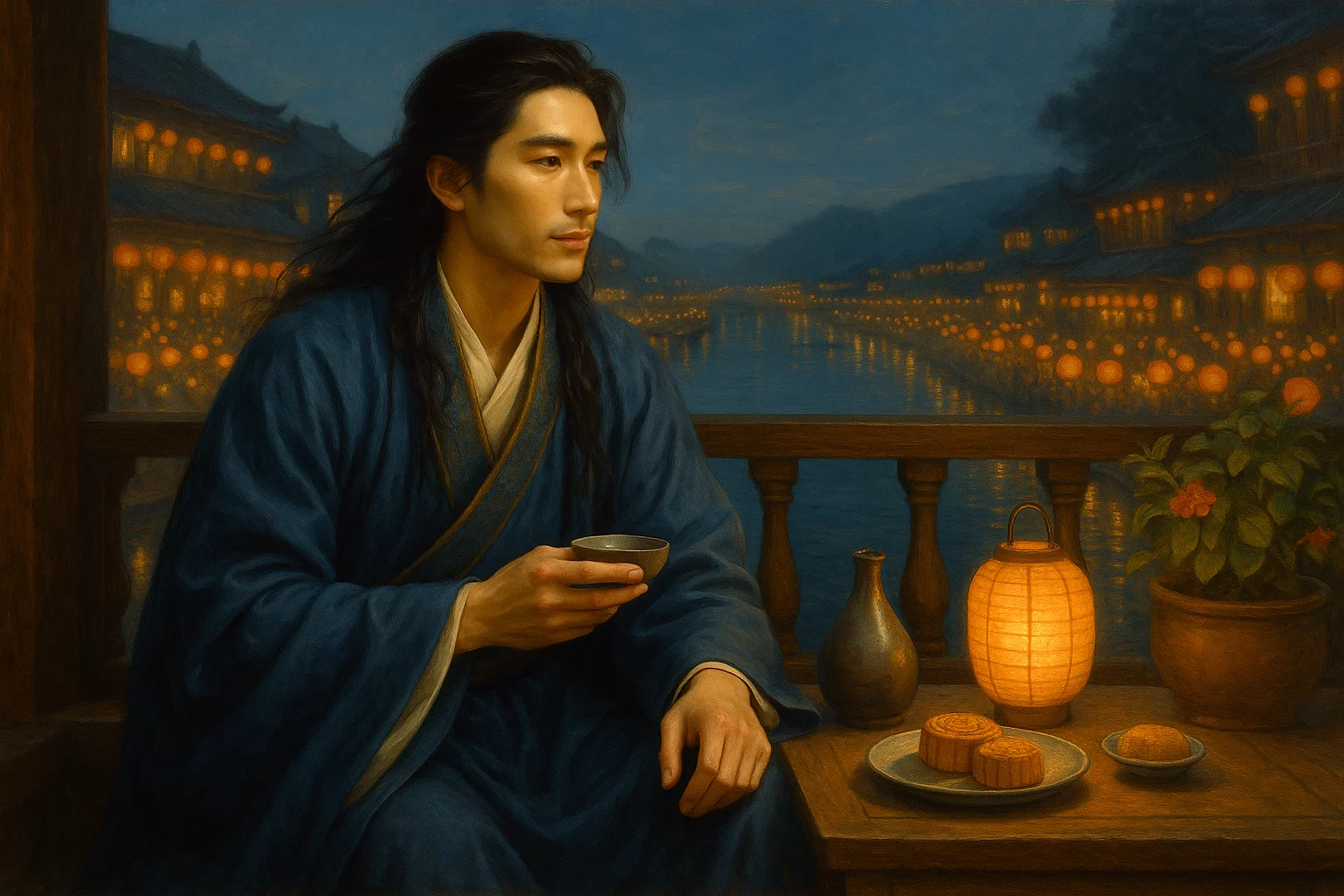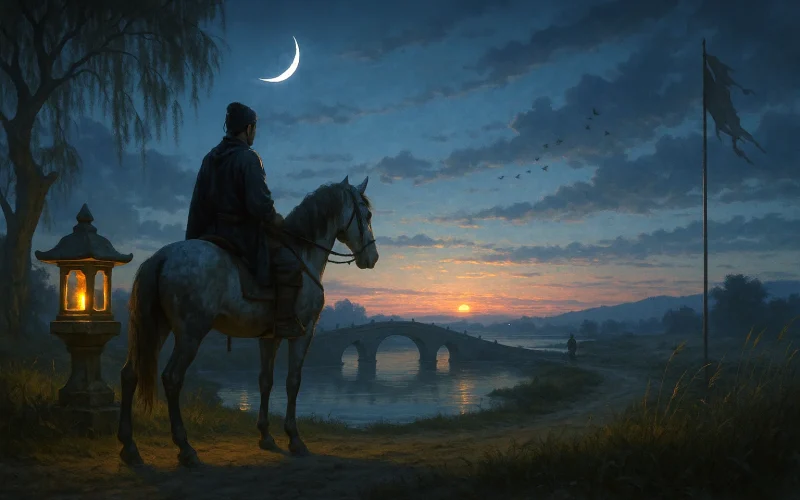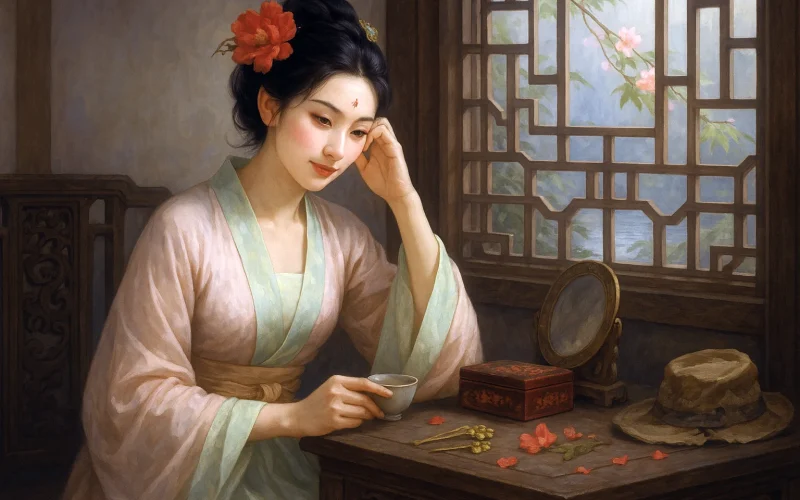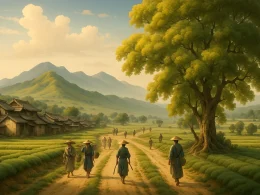River-bridge: farewell's fungal node,
Moon-spore sinks in pale mycelioid.
Bronze petri-dish exhausts candle-metabolism,
Dew inoculates sleeves with separation-prism.
Feast-mycelium decomposes—
Wind samples harbor's low-frequency,
Canopy flags cosmic embassy.
My dappled symbiont reads my rhizome,
Whip's stimulus fails to accelerate genome.
Trail's hyphae through cleared-scar,
Human acoustics fade beyond sonar.
Why re-colonize this abandoned substrate?
No jewelry-fossils, paths mycorrhizal with fate.
Trifolium-avena monoculture
Under sunset's spectrogram stretches my clone.
I fruit through grass-body,
Sigh-spore, liquor-inject, west-phone.
Original Poem
「夜飞鹊 · 别情」
河桥送人处,良夜何其?
斜月远堕馀辉。
铜盘烛泪已流尽,霏霏凉露沾衣。
相将散离会,探风前津鼓,树杪参旗。
花骢会意,纵扬鞭、亦自行迟。迢递路回清野,人语渐无闻,空带愁归。
周邦彦
何意重经前地,遗钿不见,斜径都迷。
兔葵燕麦,向残阳、影与人齐。
但徘徊班草,欷嘘酹酒,极望天西。
Interpretation
This ci poem by Zhou Bangyan of the Song Dynasty stands as one of his most representative works depicting farewell scenes. Structured around a nocturnal parting, the first stanza portrays the environment and emotions of the send-off, while the second traces the lingering aftermath along the return journey, progressing layer by layer with meticulous conception. Zhou, a master of musicality and emotional expression, crafts this work with both impeccable rhythm and profound, subtly conveyed sentiment. Dense with scenic imagery and nuanced feeling, it exemplifies Zhou's signature depth of style. Though its specific biographical context remains unrecorded, the emotional tone and descriptive approach suggest it may have been inspired by either a real, deeply felt farewell or an imagined scenario expressing Zhou's philosophical meditations on separation and life's impermanence.
First Stanza: "河桥送人处,良夜何其?斜月远堕馀辉。铜盘烛泪已流尽,霏霏凉露沾衣。"
Hé qiáo sòng rén chù, liáng yè hé qí? Xié yuè yuǎn duò yú huī. Tóng pán zhú lèi yǐ liú jìn, fēi fēi liáng lù zhān yī.
At the river bridge we part—
how profound this cool night.
The slanting moon sinks far, leaving faint glow.
Bronze dish holds candle tears all spent,
fine cold dew soaks my sleeves.
The opening establishes a parting scene at night's depth. The rhetorical "how profound this cool night" (良夜何其) echoes the Book of Songs, lending archaic solemnity to the atmosphere. Zhou avoids direct emotional declarations, instead conjuring a hushed, mournful mood through fading moonlight, exhausted candle tears, and dew-dampened sleeves—each image silently articulating unspoken sorrow. The "candle tears" (烛泪) and "cold dew" (凉露) become objective correlatives for human grief, setting the poem's emotional register: profound yet restrained.
"相将散离会,探风前津鼓,树杪参旗。花骢会意,纵扬鞭、亦自行迟。"
Xiāng jiāng sàn lí huì, tàn fēng qián jīn gǔ, shù miǎo shēn qí. Huā cōng huì yì, zòng yáng biān, yì zì xíng chí.
Our parting moment nears—
through wind I seek the ferry drum,
above treetops, Orion's banner.
My dappled horse, knowing my heart,
though whipped, still slows his pace.
Here Zhou captures liminal time between night and dawn. The "ferry drum" (津鼓) and "Orion's banner" (参旗) signal impending departure, their distant sounds and sights emphasizing the traveler's reluctance. The stanza's crowning image—the "dappled horse" (花骢) slowing despite whips—brilliantly transfers human attachment to animal intuition, achieving poignant indirectness. This equine empathy becomes the poem's most spiritually resonant moment, where creature and creator share unspoken understanding.
Second Stanza: "迢递路回清野,人语渐无闻,空带愁归。"
Tiáo dì lù huí qīng yě, rén yǔ jiàn wú wén, kōng dài chóu guī.
The long road loops through clear wilderness,
human voices fade,
I return bearing only sorrow.
Transitioning to the return journey, Zhou maps psychological desolation onto physical landscape. "Long road" (迢递路) conveys both spatial distance and emotional weight, while "clear wilderness" (清野) reflects the speaker's hollowed interiority. The fading "human voices" (人语) mark the final severance from companionship, leaving sorrow as sole companion.
"何意重经前地,遗钿不见,斜径都迷。"
Hé yì chóng jīng qián dì, yí diàn bú jiàn, xié jìng dōu mí.
Unexpectedly repassing that place—
her hairpin's trace gone,
even the winding path now indistinct.
Memory and reality diverge sharply here. The vanished "hairpin's trace" (遗钿)—a conventional symbol of feminine presence—signals irretrievable loss, while the "indistinct path" (斜径都迷) metaphorizes fading recollection. Zhou suggests that places outlive moments, yet their meaning evaporates with departed participants.
"兔葵燕麦,向残阳、影与人齐。但徘徊班草,欷嘘酹酒,极望天西。"
Tù kuí yàn mài, xiàng cán yáng, yǐng yǔ rén qí. Dàn pái huái bān cǎo, xī xū lèi jiǔ, jí wàng tiān xī.
Hare's parsley and wild oats
in sunset light stretch shadows
equal to my height.
I linger by parting grasses,
sigh, pour libations,
gaze desperately west.
The conclusion achieves sublime pathos. Common weeds ("hare's parsley and wild oats") stand witness to human transience, their elongated shadows mirroring the speaker's existential solitude. The ritual "libations" (酹酒) recall ancient farewell customs, while the final "gaze desperately west" (极望天西)—with its implied sunset and departing direction—condenses infinite longing into a single directional glance. Zhou's restraint here speaks volumes: the most intense emotions reside in what the poem doesn't say.
Holistic Appreciation
The poem's power lies in its quiet progression from shared moment to solitary aftermath. The first stanza's intimate farewell—with its candlelit intimacy and intuitive horse—gives way to the second's existential loneliness, where even geography conspires to emphasize absence. Zhou masterfully employs temporal markers (moon, constellations, sunset) to measure emotional duration, making time itself a protagonist in the drama of separation.
What distinguishes this work is its double perspective: it's both a record of a specific night and a meditation on parting's universal condition. The "hairpin's trace" vanishes not just from a path but from memory; the weeds grow not merely in a field but across time's continuum. Zhou transforms a personal goodbye into an archetypal experience, where individual grief resonates with collective human vulnerability.
Artistic Merits
- Symbolic ecology
Candle wax, dew, wild oats—each natural element becomes a hieroglyph of emotion. - Temporal architecture
The movement from moon to stars to sunset constructs a celestial clock measuring heartache's duration. - Anthropomorphic intuition
The understanding horse exemplifies Zhou's ability to invest creatures with emotional intelligence. - Ritual resonance
Libations and gazing west connect personal loss to cultural memory of farewells.
Insights
Zhou's poem reveals how farewells alter our perception of place. The same landscape that witnessed companionship becomes unrecognizable in absence—paths grow faint, traces disappear. This psychological geography suggests that meaning resides not in locations but in human presence.
For contemporary readers, the work models how to process separation with dignity. Rather than dramatic outbursts, Zhou offers quiet rituals—libations, shadow-measuring, westward gazing—that transform grief into aesthetic contemplation. His conclusion is particularly instructive: sometimes the deepest longing is best expressed not through words but through the angle of one's gaze.
Ultimately, the poem posits that parting's pain stems from doubled consciousness—we simultaneously inhabit the present's absence and memory's presence. The "hairpin's trace" exists and doesn't exist; the path is both familiar and foreign. Zhou's genius lies in making this paradox palpable, reminding us that to love is always to measure shadows against the fading light.
About the Poet

Zhou Bangyan (周邦彦 1056 - 1121), a native of Qiantang (modern Hangzhou, Zhejiang), was the culminating master of the wanyue (graceful and restrained) ci poetry of the Northern Song Dynasty. A virtuoso in musical temperament, his ci are renowned for their opulent refinement and technical perfection. He created dozens of new melodic patterns (cipai) and adhered to strict tonal rules, earning him the title "Crown of Ci Poets." His influence extended to Southern Song masters like Jiang Kui and Wu Wenying, establishing him as the founding patriarch of the Rhymed Ci School.












